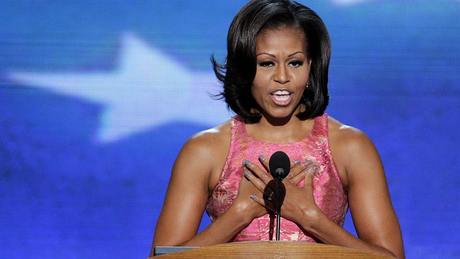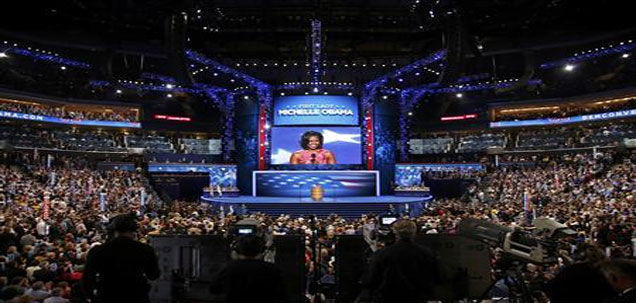
North Carolina, September 5: First lady Michelle Obama acknowledged on Tuesday that the change her husband Barack Obama sought in his White House campaign four years ago has proven difficult but urged voters to give him another term to fix the weak U.S. economy.
"He reminds me that we are playing a long game here, and that change is hard, and change is slow, and it never happens all at once," she told the Democratic National Convention in Charlotte, North Carolina. "But eventually we get there. We always do," she said.
With Democrats anxious about a race with Republican Mitt Romney that is too close to call nine weeks before the November 6 election, Mrs. Obama urged party activists to rally around the president.
"We must work like never before, and we must once again come together and stand together for the man we can trust to keep moving this great country forward, my husband, our president, Barack Obama," she said.
Under fire for high unemployment, Obama wants to use the convention to seize the political spotlight back from Romney who held his own nominating convention in Tampa last week.
A host of speakers at the gathering in Charlotte attacked Romney for his business record, refusal to release more tax returns and for spearheading a Republican "war on women."
ATTACK ON ROMNEY
The Democrats even choreographed a swipe at the former executive from beyond the grave, by playing a video of late Senator Ted Kennedy getting the better of Romney during a debate in the 1994 election campaign for Kennedy's Senate seat.
Michelle Obama's address was the Democrats' answer to Romney's wife, Ann, who gave a highly personal account of her husband in trying to present a more human side to him at the Republicans' convention.
The popular Mrs. Obama laced her speech with what seemed to be subtle digs at Romney but mostly kept her focus on her husband, recalling their early days together.
"For Barack, success isn't about how much money you make, it's about the difference you make in people's lives," she said about Romney whose fortune from private equity has been a focus of her husband's campaign.
"He was the guy whose proudest possession was a coffee table he'd found in a dumpster, and whose only pair of decent shoes was a half size too small," she said.
It was a night for women at the convention as the Democrats pressed their advantage with female voters, a gender gap that is a sore point for Republicans particularly after remarks by conservative Missouri Senate candidate Todd Akin about "legitimate rape."
Lily Ledbetter, the tough-talking Alabama advocate for equal pay for women, took the stage, as did former veterans official Tammy Duckworth and many others to criticize Romney and talk up Obama.
"He believes that women are more than capable of making our own choices about our bodies and our healthcare. That's what my husband stands for," Michelle Obama said.
The Democrats highlighted Obama's successes during his first term - from ordering the mission that killed al Qaeda leader Osama bin Laden to the bailout of the auto industry - while reminding voters of the difficulties Obama faced when he took office.
"Four years ago, America stood on the brink of a depression," Julian Castro, mayor of the Texas city of San Antonio, said. "Despite incredible odds and united Republican opposition, our president took action. And now we've seen 4.5 million new jobs."
Obama will make his acceptance speech in a 74,000-capacity football stadium on Thursday night.
His economic argument got a little tougher on Tuesday. New surveys showed U.S. manufacturing shrank at its sharpest clip in more than three years last month, while exports and hiring in the sector also slumped.
Republicans stayed on the offensive, criticizing Obama for telling a Colorado television reporter that he would give himself a grade of "incomplete" for his first term.






Comments
Add new comment